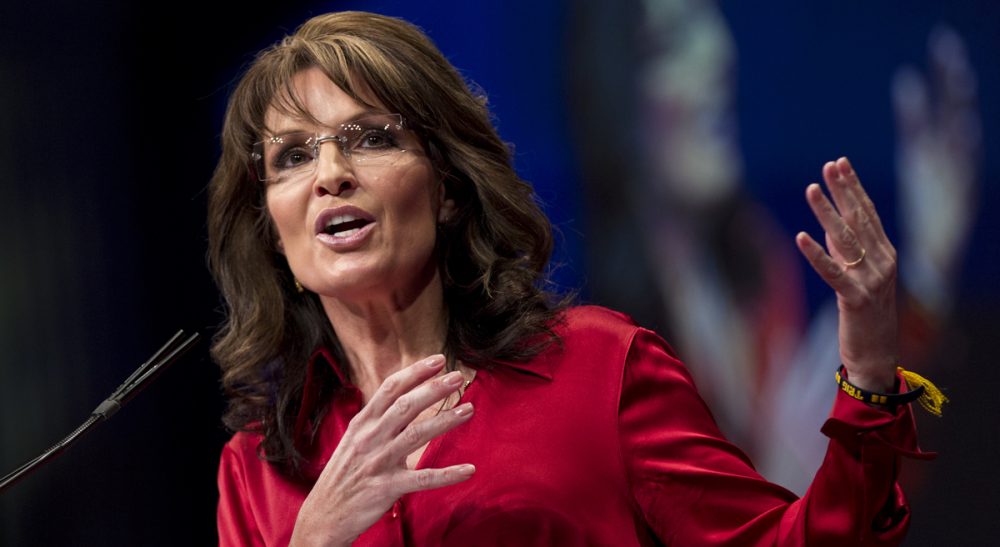Advertisement
Moms And Midterms: Which Politicians Play Up Their Parental Status?

Every now and then the right cultural moment collides with the right female candidate, producing a “mom quip” that has traction for years to come.
Sometimes the candidate is a little-known figure trying to break out onto the national political scene. For instance, Patty Murray of Washington state was “a mom in tennis shoes” when she ran for the U.S. Senate in 1992.
And then there was Sarah Palin, a vice presidential candidate in 2008 who was initially — in what seems like eons ago — “Sarah who?” She notoriously cited “lipstick” as the qualifying difference between a hockey mom and a pit bull.
Both women used their “mom status” as a way to connect with the public, secure votes, boost their qualifications for elected office and give themselves a patina of likability. Or, feminine feistiness with a maternal twist.
I was curious to find out: Do moms running for office use their 'mom status' as a tool for political advancement? Do candidates talk about motherhood as a job qualification in and of itself?
We’re in a cultural “mom moment.” Women are pressured to consider whether they can “have it all,” which Sen. Kirsten Gillibrand (D-NY) describes as “insulting.” “What are you ‘having,’” she asks. “A party? Another slice of pie?” We’re also told that modern parenting is “all joy and no fun.” So I embarked on a study to see how women candidates running for high office in the midterm elections frame the role of motherhood in their campaigns.
I looked at the “About” webpages of 21 candidates who are mothers, focusing on competitive Congressional races, using the The Cook Political Report as a guide. I also included the campaign of Texas Gubernatorial candidate Wendy Davis, since she’s received significant national attention as a single mother and also as a woman who has had two abortions. I was curious to find out: Do moms running for office use their “mom status” as a tool for political advancement? Do candidates talk about motherhood as a job qualification in and of itself?
Three themes emerged from my analysis. Here’s the breakdown:
The first category includes candidates who employ their “mom status” as a central part of their political narrative. U.S. Senate candidate Joni Ernst (R-IA) belongs in this category. The header on her “About” page reads “Mother. Soldier. Independent Leader.” Not only does her “mom status” affirm her credentials for office — they lead the way. Ten of the 21 candidates fit into this category.
The second theme includes candidates whose “mom status” is merely biographical. Here, motherhood is not central to influencing their political lives, nor is it a job qualification for elected office. Sen. Mary Landrieu (D-LA), who is running for reelection, belongs in this category. Her children receive as much of a “shout out” as her dog. On her “About” page we learn: “She is married to Frank Snellings of Monroe, and they have two children, Connor and Mary Shannon, and a dog, Sugar Belle.” Nine of the 21 candidates fit into this category.
The final theme includes politicians who are mothers but make only the slightest reference to being a mom. For instance, U.S. Rep. Carol Shea-Porter (D-NH) writes, “I am running again because I believe we must keep America the land of opportunity and fairness for your children and mine.” We can infer she has children but she doesn’t provide biographical information about them. There are two candidates in this category.
So what does this all mean? I’d argue that motherhood is useful for candidates — but only for those who are challengers, and certainly not for those running for reelection. In every instance where the “mom status” was a central part of the political narrative, the candidate was a challenger. Untested on the national scene, a strong “mom status” perhaps offers a cognitive shortcut to voters to show that the candidate is competent and effective — good at negotiation and organizational management — and that she fulfills the social expectations of her gender. However, not a single incumbent played up her “mom status.” After all, they can point to a Congressional track record without having to highlight skills that motherhood taught them.
a strong 'mom status' perhaps offers a cognitive shortcut to voters to show that the candidate is competent and effective...and that she fulfills the social expectations of her gender.
Every time the “mom status” proved central to a candidate’s political story that candidate was a challenger. That said, not every challenger is professionally attached to her maternal status. For instance, three of the nine women who describe their mom status in a merely biographical way are challengers.
Overall challengers typically showcase their “mom status” more than incumbents. But that doesn’t mean all challengers will play the mom card, and that no incumbent will. Consider this: 10 of the 21 politicians never once used the words “mom” or “mother” to describe themselves, even though they’re all mothers. There are three challengers in that group. Meanwhile, of the 11 politicians who did use the words “mom” and “mother” to describe themselves, only one was an incumbent.
So while we can say that challengers are more mom-focused than incumbents — at least in the “About” pages — it’s certainly not an ironclad rule.
This once again demonstrates that when it comes to motherhood, a unifying “mom brain” does not dominate.
A paper on this topic, “Maternal Frame: Women Candidates and the Construction of Motherhood in the 2014 Midterm Campaigns,” will be presented at the annual Northeastern Political Science Association conference in Boston later this month.
Related:
